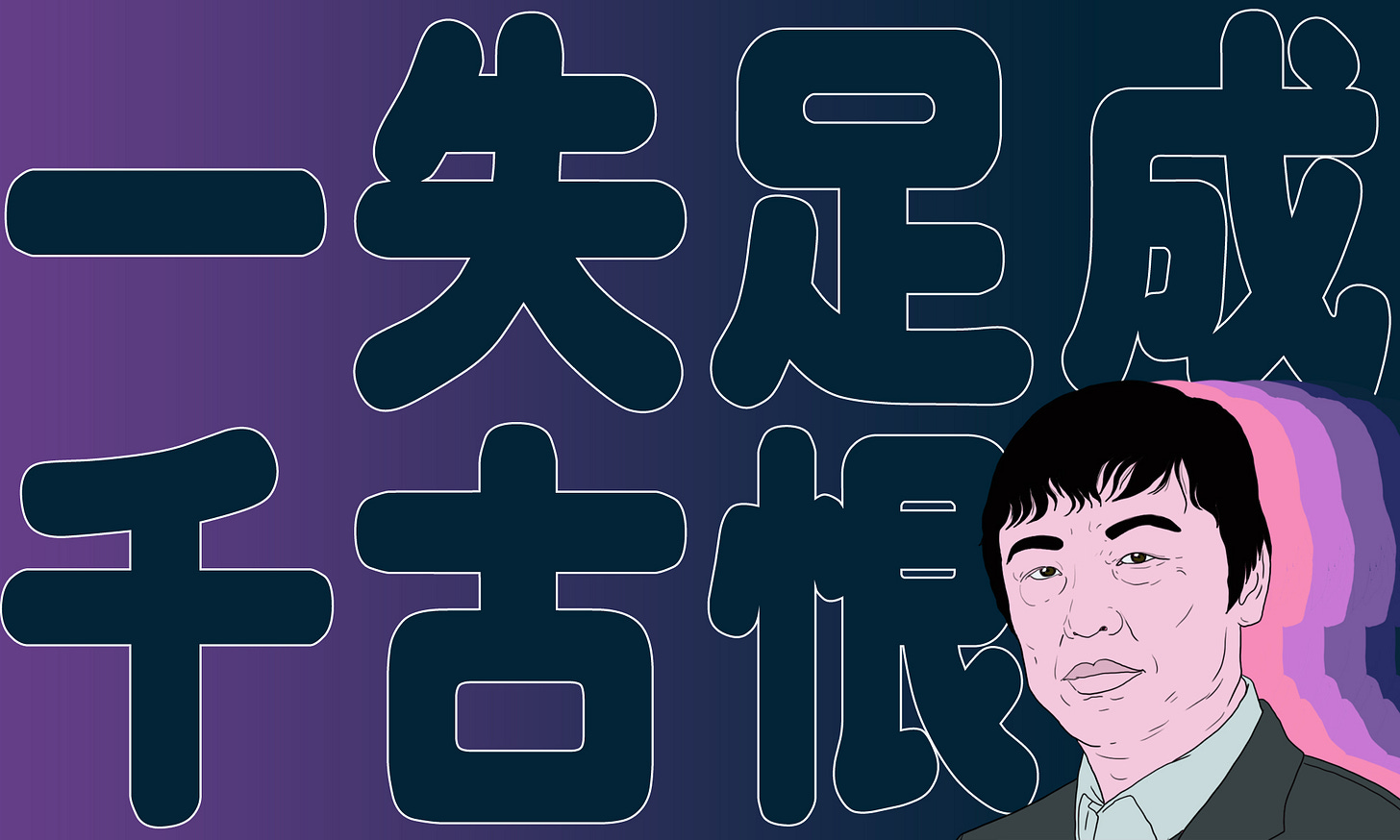"A single misstep can lead to a lifetime of regret" — Phrase of the Week
Hu Xijin has disappeared from public view

Our phrase of the week is: "a single misstep can lead to a lifetime of regret" (一失足成千古恨 yì shī zú chéng qiān gǔ hèn)
Context
One of China’s most vocal online nationalists has seemingly been suspended from posting on Chinese social media platforms.
The former editor-in-chief of the Global Times (环球时报 huánqiú shíbào), Hú Xījìn 胡锡进, has not been heard from on any of his social media channels since July 27.
The reason for his sudden disappearance from public view is unknown, but many believe it is because of an article Hu published on July 22 on his WeChat public account, about the outcome of the recently concluded Third Plenum meetings in Beijing.
In this now-deleted article, “The Removal of this Key Phrase is a Historic Change” (取消这一关键表述,是历史性变化 qǔxiāo zhè yī guānjiàn biǎoshù, shì lìshǐ xìng biànhuà), Hu suggests there may be good news for the private sector:
During the Third Plenum, the phrase "public ownership as the mainstay" was removed from the Decision, signaling that the non-public sector of the economy has achieved true equality with the public sector.
三中全会在《决定》中取消“公有制为主体”的表述,昭示着非公有制经济与公有制经济实现了真正的平等。
Sān zhōng quánhuì zài “juédìng” zhōng qǔxiāo “gōngyǒuzhì wéi zhǔtǐ” de biǎoshù, zhāoshìzhe fēi gōngyǒuzhì jīngjì yǔ gōngyǒuzhì jīngjì shíxiànle zhēnzhèng de píngděng.
According to Chris Buckley of the New York Times, it’s Hu’s interpretation of the dropping of the term, “mainstay” (主体), and that it signals the private sector may become more important and “equal” to the state-owned sector, which may have got him in trouble.
If this is the reason for Hu Xijin’s sudden silence, he may have crossed a line in making the wrong interpretation about the economy and the private sector at a time when discussions about the economy are so fraught:
"If you often travel at night, you're bound to encounter a ghost eventually.
And so, with one careless move, everything is lost. Even Old Hu ended up being suspended from posting!
This truly is a case of "A single misstep leads to a lifetime of regret; when one looks back, a thousand years have passed."
夜路走多了,总有遇到鬼的时候。 于是,一着不慎,满盘皆输,老胡,竟然也被“停更”了! 这真是,一失足成千古恨,再回首是万年人。
Yè lù zǒu duō le, zǒng yǒu yù dào guǐ de shíhou.
Yúshì, yì zhāo bú shèn, mǎn pán jiē shū, Lǎo Hú, jìngrán yě bèi “tíng gēng” le!
Zhè zhēn shì, yì shī zú chéng qiān gǔ hèn, zài huí shǒu shì wàn nián rén.
And with that we have our Sinica Phrase of the Week!
What it means
"A single misstep can lead to a lifetime of regret" is a well known colloquial phrase in Chinese.
Its origin is The Chronicles of the Ming (明良记 míngliáng jì), a history of the Ming Dynasty (1368–1644.) compiled by Yáng Yí 杨仪, a writer, official and calligrapher alive during the later years of that period.
The phrase is original found in this passage of the book:
Once the talented scholar, Tang Yin, was removed from office.
The poem about his life says: 'A single misstep leads to eternal regret; when one looks back, a lifetime has passed.
唐解元寅既废弃,诗云: ‘一失足成千古恨,再回头是百年人。
Táng jièyuán yín jì fèiqì, shī yún: 'Yì shī zú chéng qiān gǔ hèn, zài huí tóu shì bǎi nián rén.'
Táng Yín 唐寅, commonly known as Táng Bóhǔ 唐伯虎, was a Chinese painter, calligrapher, and poet of the Ming dynasty period.
At 29, he participated in the provincial examination in Nanjing and again secured the top position of "jieyuan" (解元 jièyuán). But as he was eagerly preparing for the next year's metropolitan examination in Beijing, the capital during Ming times, it was discovered that another participant in the test had obtained the examination questions in advance through bribery.
When this was exposed, Tang was also implicated through association. He was in the wrong place at the wrong time, stripped of his jieyuan title, and imprisoned.
After his release, as recorded in the Chronicles of the Ming, Tang lamented, "A single misstep leads to eternal regret; when one looks back, a lifetime has passed."
This full two-part phrase is commonly used in modern Chinese, as in the commentary on Hu Xijin above. But the but the shorter version, "A single misstep can lead to a lifetime of regret" (一失足成千古恨), is also common and implies the full meaning.
In describing the disappearance of Hu Xijin the phrase is used humorously, and is meant as an exaggeration.
Hu's social media channels still are visible online, so, like a frisbee, Hu Xijin will probably will be back.
Although, just as Tang Yin lamented hundreds of years before him, Hu will probably regret his misstep for much longer.
Andrew Methven is the author of RealTime Mandarin, a resource to help you learn contemporary Chinese in context, and stay on top of the latest language trends in China.
Read more about how this story is being discussed in the Chinese media in this week’s RealTime Mandarin.


